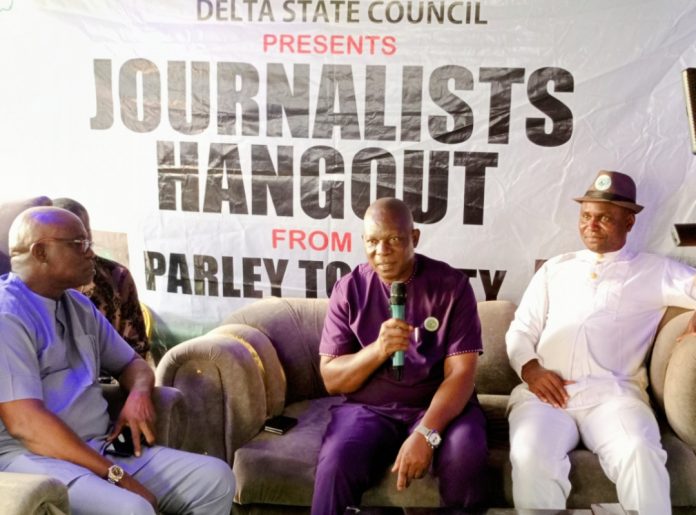The Managing Director of the Delta State Oil Producing Areas Development Commission (DESOPADEC), Chief Festus Ochonogor, detailed the commission’s strides and challenges during the 17th edition of the Journalist Hangout organized by the Delta State Council of the Nigeria Union of Journalists (NUJ). The event, tagged From Parley to Party, provided a platform for dialogue between journalists and key stakeholders in the state.
Chief Ochonogor emphasized the commission’s critical role in complementing the state government’s efforts in addressing the needs of oil-producing communities. DESOPADEC, established in 2007, arose from the state’s commitment to tackling issues of environmental degradation, oil spillage, and underdevelopment in oil-bearing areas.
“The commission is a critical agency of the Delta State government. By law, 50% of the derivative fund is allocated to DESOPADEC to implement social protection programs aimed at improving the lives of oil-bearing communities,” said Ochonogor.
He outlined the commission’s dual approach to budgeting: a centralized budget managed by the state government and a Nationality Budget catering to six ethnic nationalities – Ijaw (27%), Itsekiri (25%), Urhobo (21%), Isoko (17%), Ndokwa (9%), and Ika (1%). These budgets are guided by the quantum of oil production from each nationality, ensuring equitable resource allocation.
Highlighting DESOPADEC’s achievements, Ochonogor stated, “We have provided critical infrastructure, completed drainage projects, and rolled out empowerment programs.” Over 200 youths have received empowerment packages, including seed capital of ₦500,000 each – a first in the commission’s history.
Additionally, the commission has prioritized human capital development, recently conducting its fifth empowerment drive under the current administration. “We are committed to meeting the objectives of the commission by balancing infrastructural development with human capacity building,” Ochonogor noted.
Chief Ochonogor acknowledged the complexities of managing a commission representing six ethnic nationalities. “There’s always a tendency for divergent interpretations of issues,” he said. The management has taken proactive steps to foster unity, including regular engagements with workers and ethnic stakeholders.
He added, “Managing over 2,000 workers and ensuring stability requires wisdom. By providing access to workers and addressing their needs transparently, we’ve achieved tranquility within the system.”
Since assuming office, the current DESOPADEC board has focused on completing inherited projects while laying the groundwork for new initiatives. “We’ve spent the past year completing critical ongoing projects. In October, we began executing the 2023 budget, which will roll over into 2024,” Ochonogor explained.
The commission has also played a significant role in aligning with Governor Sheriff Oborevwori’s M.O.R.E Agenda, which aims to enhance development and empowerment programs across the state.
Comrade Churchill Oyovwe, Chairman of the Delta State Council of the NUJ, commended DESOPADEC’s leadership for its transparency and dedication to development. He lauded the Journalist Hangout initiative, describing it as a platform for fostering mutual understanding between the media and stakeholders.
Oyovwe noted, “The hangout goes beyond the traditional news setting. It allows stakeholders to highlight achievements and milestones in a relaxed and engaging environment.”
The event underscored the importance of collaboration and open dialogue in driving progress within Delta State. As DESOPADEC continues its mission, its achievements and challenges remain a testament to its pivotal role in the state’s development agenda.



